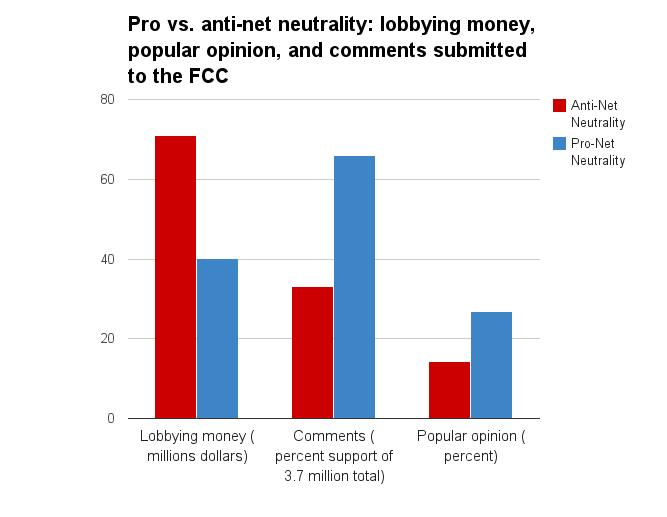Federal Communications Commission Chairman Tom Wheeler handed a big win to Internet companies and the American public today, announcing strong support for net neutrality. Well-heeled telecoms shelled out far more cash on Capitol Hill to stop today’s FCC’s decision than their Internet counterparts spent. Despite this, Internet companies were much better organized online and had overall more support from the American public.
The FCC received somewhere north of 3.7 million comments during its net neutrality open commenting period, and the watchdog group, The Sunlight Foundation, estimates that about two-thirds were in support.
In total spending, the most outspoken, big-spending telecommunications companies (Comcast, Verizon, AT&T, CTIA, and The National Cable and Telecommunications Association) spent around $71 million on lobbying, according to data culled from Opensecrets.org.
Internet companies have historically been outspent on this issue, and 2014 was no exception. Google, Facebook, Microsoft, Netflix, and Amazon collectively shelled out about $40 million.
June 5th: The AI Audit in NYC
Join us next week in NYC to engage with top executive leaders, delving into strategies for auditing AI models to ensure fairness, optimal performance, and ethical compliance across diverse organizations. Secure your attendance for this exclusive invite-only event.
It helped that the Internet companies also had broad public support on net neutrality. In a national poll conducted late last year, we found that about twice as many people supported net neutrality (26.8 percent, vs. 14.3 percent opposed), if they had an opinion on the issue.
It’s worth noting that Internet companies are not underdogs here. According to Opensecrets.org, computer and Internet companies as an industry spent an astounding $138 million on lobbying in 2014. Telephone utilities and telecommunications as a combined industry group only spent about $90 million. It’s also worth noting that President Obama, who appoints the FCC chief, vastly outraised Republicans, especially with the help of Internet executives. So sometimes power is about total lobbying reach and not the issues themselves.
Regardless, the issue isn’t settled yet. Telecom companies will likely sue the FCC, and Republicans in Congress don’t like the idea of the regulatory body deciding the issue on its own. The fight is ongoing, but it shows that this political game is not decided by money alone.


